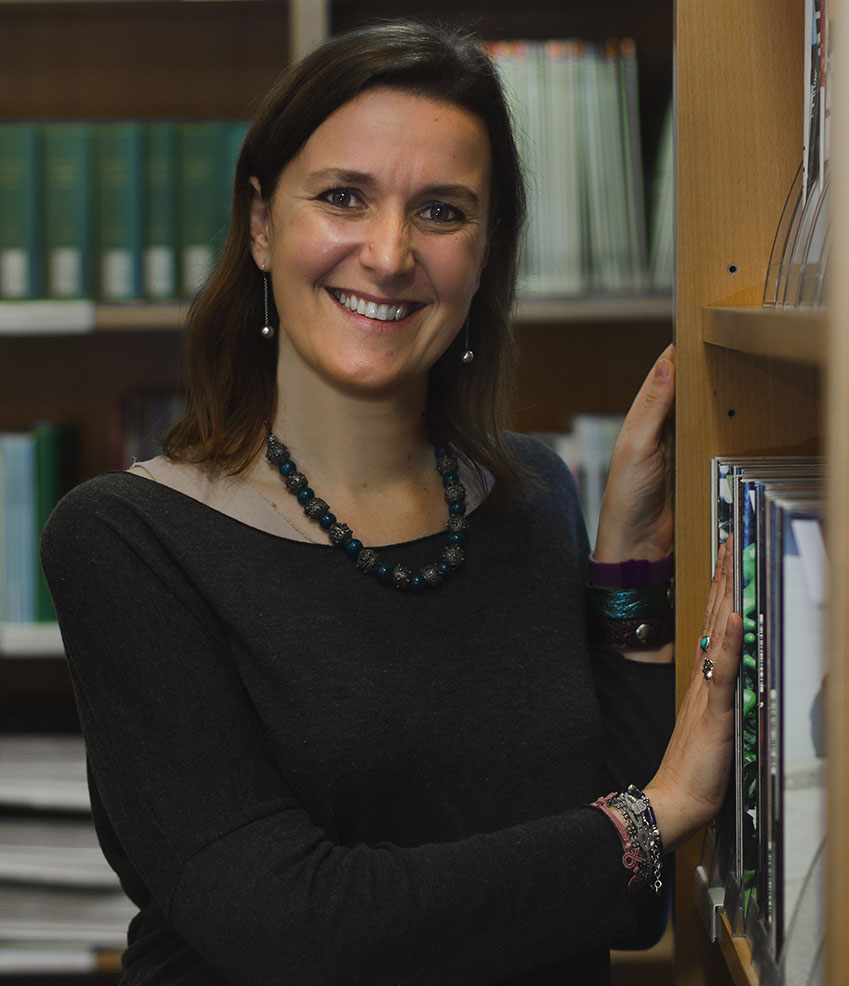Librarian Livia Piotto Co-Edits Book on Faculty-Librarian Collaboration

Livia Piotto
Interim Head Librarian and Reference and Instruction Coordinator Livia Piotto has been working at JCU’s Frohring Library for almost 15 years. She holds an Italian laurea degree in foreign languages and literature, with a thesis on the translation of oral Native American literature into written English. Livia recently co-edited and contributed to the book Faculty-Librarian Collaborations: Integrating the Information Literacy Framework into Disciplinary Courses (ACRL, 2020). She is an active member of AMICAL, the American International Consortium of Academic Libraries.
What brought you to JCU?
Sending my CV to JCU seemed like a natural option that would allow my love for the English language and for libraries to come together. I was lucky to meet Elisabetta Morani, former Head Librarian, and privileged to be chosen by her to be Reference Librarian back in 2006. Since then, my job shifted from just providing reference support to providing in-class instruction to faculty and students as well, and that has become the most important part of my daily work. Working with people is definitely the aspect that I like the most about my job. I like helping both students and faculty finding a solution to their problems, be it an obscure book or a more general research issue. Librarians help to maintain a live space that is dedicated to sharing ideas and knowledge, a space that is made for everyone and by everyone. A famous “library law” says that a library is a growing and living organism, and the librarian is the person that is open to change to make sure the library evolves to meet the needs of all the members of the community. This applies not only to the library but to courses too.
Congratulations on co-editing and contributing to the Faculty-Librarian Collaborations: Integrating the Information Literacy Framework into Disciplinary Courses. Can you tell us more about the project?
Faculty-Librarian Collaborations: Integrating the Information Literacy Framework into Disciplinary Courses is the result of the work that began in the AMICAL workshop “Co-design: Integrating Information Literacy into Your Disciplinary Course” held in Paris in 2017. I co-edited the book with colleague and friend Michael Stoepel, User Services Librarian at the American University of Paris, and Samantha Godbey and Xan Goodman, librarians at the University of Nevada, Las Vegas. The book is a collection of insights on the workshop, case studies based on what participants learned and applied after it was held, and practical lesson plans that faculty and librarians developed collaboratively. The common thread connecting the variety of contributions is the collaboration between faculty and librarians to re-design disciplinary courses to include information literacy concepts in a more organic way, as opposed to the standard one-shot sessions that librarians usually offer.
Tell us about the case study that you co-authored with Communications Professors Antonio Lopez and Elizabeth Macias-Gutierrez. What are the essential information literacy skills and practices that can help students/people become better media consumers and creators?
I am co-author with Professor Lopez and Professor Macias-Gutierrez of a case study that describes how we restructured the Writing Across the Media course to integrate the presence of a librarian to help students understand the implications of doing accurate research in media studies. In 2017, I attended the AMICAL workshop in Paris with Professor Lopez. Together we redesigned the course to include four library sessions aimed at teaching students how research can help and enrich their critical thinking as media consumers and, most of all, creators. Since Professor Macias-Gutierrez started teaching the course, we regularly update the content of the sessions that we co-teach in order to make them relevant and, most of all, engaging for the students.
How can the presence of a librarian in class benefit students and enhance the learning process?
There are many ways a librarian can benefit students, it really depends on the job you perform. In my case, I have been lucky to work in close contact with them, so I get to share my expertise in doing research. Since Writing Across the Media is one of the core courses for the Communications major, it is a prime example of faculty and librarians collaborating to teach students all aspects related to news dissemination, especially in a digitally polarized world. Research is a skill that everyone should have in order to be able to analyze the media and understand how it is utilized as a way to engage with the masses. Knowing how to recognize misinformation or disinformation is essential for anyone who wants to use the media, both as a consumer and as a creator.
You are a member of the American International Consortium of Academic Libraries and are currently serving on its Information Literacy Committee. What is the committee’s goal?
The Frohring Library has been part of the AMICAL consortium since 2014, when it was created in Paris to help American liberal arts institutions outside of the United States to establish a network to support collaboration between libraries, faculty, and information technology services. I have been part of the Information Literacy Committee (now renamed Information Literacy Initiatives Committee) for the past 5 years. The mission of the committee is to maintain information literacy as one of the traditional hallmarks of liberal arts education. The committee seeks to find synergies between digital and information literacy initiatives and communities. And, most of all, it strives to create collaborations with faculty and instructional technologists to ensure that information literacy concepts remain central for developing critical thinking in learners.





